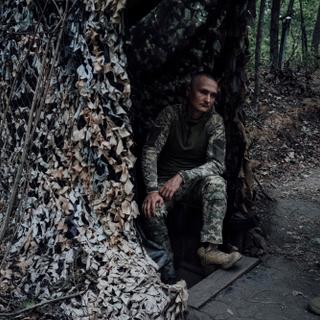


Ukraine's dashed hopes after three months of an incursion in Russia that was supposed to change the course of the war
Long ReadThree months after a successful launch, Ukraine's surprise attack on Kursk does not appear to have changed the situation in a conflict that is dragging on and on. Hoping to come to the negotiating table with a territorial gain, Kyiv still lacks both human and material resources.
For a few hours on October 10, a Ukrainian infantry unit of 30 soldiers still held the village of Snagost, on the western flank of the Kyiv forces' incursion towards Kursk, in Russian territory. Wounded by shrapnel, its leader, "Kolot" by his nom de guerre managed to avoid being surrounded and retreated with his men to Lyubimovka, four kilometers further east. This was still the location for the new lateral front line of an attack launched by Ukraine at the beginning of August, in the hope of changing the course of the war. "The Russians are advancing slowly, but they're advancing," said 37-year-old Kolot on October 16, cap pulled down to his ears, back in the underground bunker of the second battalion of the 17th tank brigade, in the deserted Ukrainian border village of Yunakivka.
Alongside him, the battalion's leader, known as "the Greek" – in recognition of his Greco-Roman wrestling skills – was barely more enthusiastic about the Ukrainian operation on Russian territory. "During maneuvers around Lyubimovka, the documents and equipment left behind by the Russians showed us the level of intelligence they had about our forces and movements," he recounted. He also criticized the lack of resources: "Where we put a section, they put a company; where we dig basic shelters, they build fortifications worthy of a battalion HQ."


Three months after the surprise attack on Kursk, the officers, soldiers and civilians interviewed by Le Monde have mixed feelings about the results of this strategy. The Greek made no bones about it: "Only 56% of the objectives have been met, the Russians reacted quickly, they're relying on reinforcements we don't have and using their soldiers as cannon fodder." This incursion into Russia boosted morale and changed the way some allies viewed the course of the war, but it didn't reverse the trend in military terms.
Against a backdrop of great weariness, even the most hardened characters made no secret of their hope of putting an end to this protracted war. Kyiv wanted to come to the negotiating table with a territorial gain to play Vladimir Putin at his own game. The Russian president is in favor an agreement on the current fixed front lines. But will he agree to talks before he has retaken the Kursk enclave, especially if he is receiving help from thousands of North Korean troops, whose deployment in Russia was confirmed on October 23 by the US and NATO?
You have 87.4% of this article left to read. The rest is for subscribers only.
